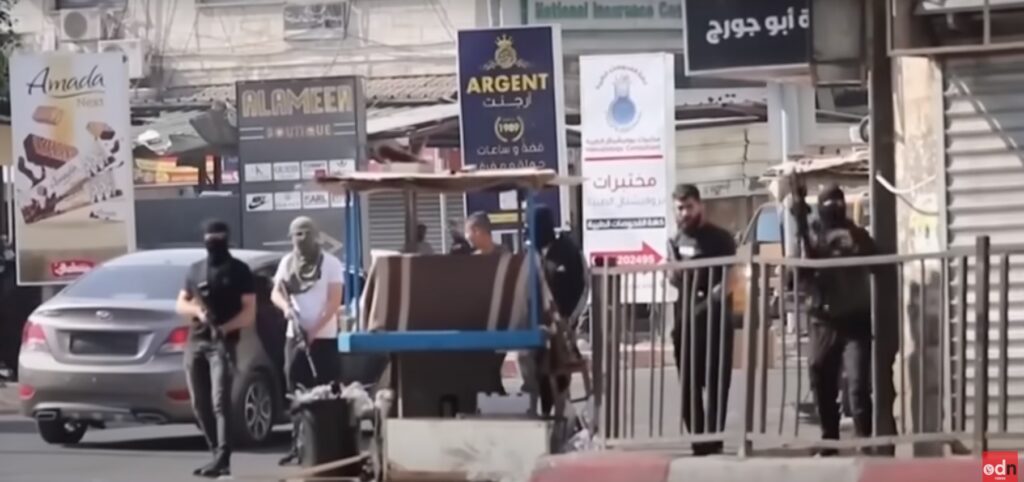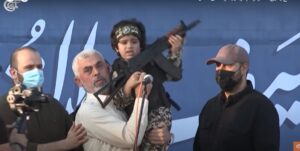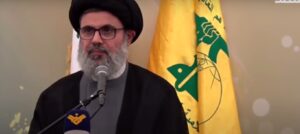At the start of the week, around 600 security personnel from the Palestinian Presidential Guard were deployed in Jenin.
Their entry into the city was coordinated with the IDF as part of the security cooperation between Israel and the PA.
Despite Abbas’s announcement that all contacts with Israel and security coordination had been terminated following the IDF operation in the Jenin refugee camp, the PA security forces returned to Jenin.
Currently, the return of PA security forces to the Jenin refugee camp remains uncertain.
The armed groups in the camp are not prepared for the presence of PA security personnel, whom they accuse of being “agents of Israel.” Although Abbas is scheduled to visit Jenin tomorrow, he is not ready to directly confront these armed groups.
PA officials claim that the entry of PA security forces into Jenin was prompted by intelligence suggesting that Hamas gunmen intended to attack PA institutions in the city, such as the Muqataa building.
Senior security officials in Israel argue that the IDF did the work that Abbas should have done to combat terrorism in northern Samaria.
Over the past two years, terrorism has grown in Area A. The PA’s special forces, trained to fight terrorism in Jordan under American supervision and guidance, were supposed to address this issue. However, Abbas chose to avoid doing so in order to maintain his position of power.
Jenin residents claim that the PA security forces returned to the city “on top of Israeli tanks,” implying that they are working in the service of Israel and coordinating with the IDF.
On July 9th, the Defense Cabinet decided on a series of measures to prevent the collapse of the PA. These measures, to be implemented soon, provide the PA with another opportunity to regain control of the Jenin area with the backing of the IDF.
Despite its failures, Israel continues to view the PA as the primary force in the fight against Palestinian terrorist groups in northern Samaria.
Tzachi Hanegbi, head of the National Security Council, revealed this week that the PA requested Israel to extend the IDF operation in the Jenin refugee camp and remain there longer to eliminate or at least weaken the armed terrorist groups. This would allow the PA to regain control of the camp.
Israel does not want the PA to collapse as it plays a crucial role in the war against terrorism.
The collapse of the PA could lead to security chaos in Judea and Samaria, jeopardizing the lives of half a million settlers in the area and enabling Hamas and Islamic Jihad to gradually take control with Iranian financing.
Mahmoud Abbas aims to return his forces to Jenin without any casualties, in order to maintain the PA’s image as one that avoids unnecessary civil wars.
However, the fact that the IDF conducted the security operation for the PA portrays him and his security forces as collaborators with Israel. It seems he is willing to accept this consequence.
Last week, Abbas gathered the heads of the Palestinian Authority’s security mechanisms and declared that their return to Jenin is the initial step towards regaining the PA’s security control over northern Samaria, albeit after the IDF completes the necessary work.
Israeli security officials emphasize that the presence of PA security forces in the main cities of Judea and Samaria is primarily in Israel’s interest.
The IDF and the Civil Administration should not be responsible for managing the day-to-day lives of three million Palestinians residing in the region.
Sources within the Fatah movement suggest that Abbas now has an interest in keeping his forces in the Jenin area due to anticipated funds for the reconstruction of the Jenin refugee camp.
He wants to control the money so that it passes through the PA’s coffers and is under his supervision.
The United Arab Emirates pledged a $15 million donation for camp rehabilitation, while Algeria announced a $30 million contribution. UNRWA is also expected to provide funds, along with possible contributions from other countries.
The PA claims it has no intention of entering the Jenin refugee camp and arresting Hamas and Islamic Jihad activists. However, it is evident that the IDF will have to return to prevent the camp from becoming a “sanctuary city” for terrorists.
Hamas’s military wing recently released a video indicating that terrorist activities in the camp continue even after the IDF operation. The video shows terrorists preparing hundreds of small explosive devices for use against IDF forces.
The resentment towards the PA and its security forces in the Jenin area is growing. The residents of the Jenin refugee camp will not forget how the PA security forces stood aside during the IDF operation inside the camp last week.
There was an expectation that some of them would fight alongside the armed terrorists against the IDF forces, but this did not happen.
The Palestinian Authority’s chairman is solely concerned about his own continuance in power and is not interested in engaging with Israel or the Biden administration, fearing that the PA’s security forces will be implicated in aiding terrorism.



